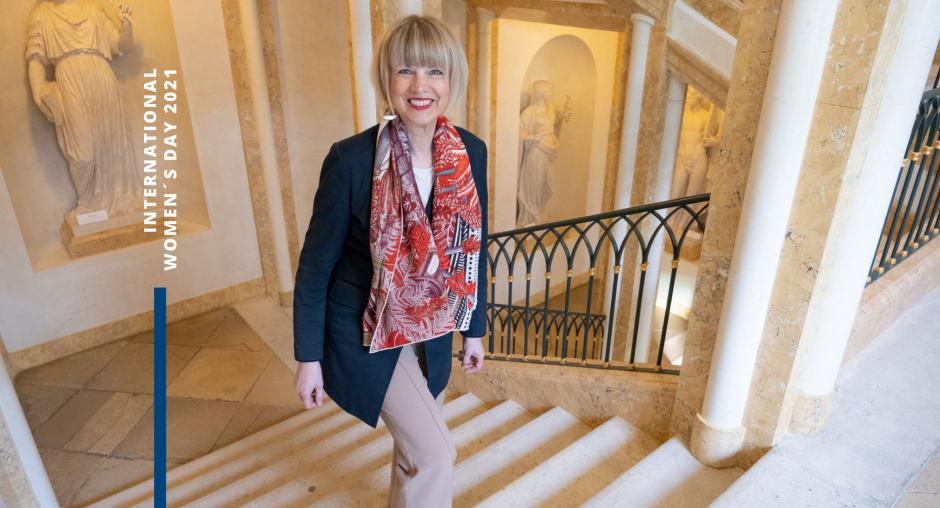It’s more than a seat at the table: why we need women in security

You often hear people say that women should have a seat at the table. And in this day and age, it seems like common sense. I have sat at many a negotiation table and, when I looked around, I hardly saw any women at the table.
Even today, the views of women are often overlooked. That’s the voices of half of the population! We need to lift women up not just so they can reach the table, but so all of society can benefit. Comprehensive security can only be achieved if everyone in our populations is included. Words are no longer enough.
Security sectors that reflect the communities they serve are more likely to be accessible and more effective in establishing and maintaining peace and stability. By increasing the inclusion of women, we strengthen security and conflict prevention in a pragmatic way. This ultimately leads to more stable and sustainable security for all.
Women’s leadership in security is not just a benefit, it is a necessity. This is enshrined in the United Nation’s Security Council Resolution (UNSCR) 1325 on Women, Peace and Security, which, already over 20 years ago, affirmed that peace and security efforts are more sustainable and effective when women are equal partners and their rights upheld.
Beyond just words, there is concrete evidence that women’s participation in conflict prevention and resolution improves outcomes. A United Nations Global Study on 1325 (2015) shows that peace processes have a 20 to 35% higher chance of lasting when women participate. Yet women are still not at the table! Between 1992 and 2019, women constituted, on average, only 13% of negotiators, 6% of mediators and 6% of signatories in major peace processes. The evidence is clear, and the time for talk is over. We need action.
As a strong supporter of UNSCR 1325, the OSCE takes proactive steps to help its participating States in advancing the Agenda. The Organization and its Field Offices train and mentor young women professionals, encourage their participation in many spheres of society, and support women’s peacebuilding networks on the ground.
Between 2018 and 2020, over 270 young women from countries across the OSCE region and its Partners in Co-operation have participated in the OSCE’s 9-week Scholarship for Peace and Security Training programme. By supporting young women in deepening their knowledge of conflict prevention, arms control and disarmament and expanding their networks, we help open the door for them to become the leaders of tomorrow and to participate fully in these critical areas of work.
By recognizing the underrepresentation of women in policing in several OSCE countries, an ambitious OSCE project launched in 2020 developed a set of concrete recommendations on how to increase women’s participation in the police and support their career advancement. This project reinforces the fact that women police officers are more likely to resolve volatile situations without using physical force and they improve investigations, particularly in cases involving gender-based violence, sexual offences and children.
But women’s full participation in security and society more broadly is not possible without increasing women’s economic empowerment. The links between women’s economic empowerment and comprehensive security and sustainable development will be the focus of this year’s high-level OSCE Economic and Environmental Forum. Organized by the OSCE Swedish Chairpersonship and the Office of the Co-ordinator of OSCE Economic and Environmental Activities, the Forum will explore how strengthening policy and legislative dimensions, as well as women’s participation in and access to the economy can lead to more inclusive, prosperous and stable societies.
As the largest regional security organization in the world, the OSCE must lead by example, and things are changing.
The OSCE Secretariat is now run by a woman for the first time. I am honoured to carry that torch and to see other women joining me in top leadership roles like the Chairperson-in-Office, the Chairperson of the Permanent Council and the Representative on Freedom of the Media.
It is so encouraging to see how the OSCE’s Gender Parity Strategy enriches the way the Organization works. Women are leading the OSCE’s Conflict Prevention Centre, heading field operations, and managing patrol hubs and monitoring teams. They are also spearheading projects ranging from arms control to ensuring economic and environmental security and safeguarding human rights.
The Strategy’s aim is to increase the number of women, especially in senior management roles, to achieve full gender parity by 2026. This goal is attainable.
As the OSCE continues to make strides both within its own walls and throughout our region, I will continue to push for women in leadership and inclusion in all parts of our communities.
Change can happen, and as long as we don’t give up, it will happen. We must continue to lead by example and support women to take their seats at the table so we can build a more equitable, prosperous and secure society for us all.

